There is a popular quote that you’ve almost certainly heard before: “It’s not the destination, it’s the journey.” It’s a quote often attributed to philosopher Ralph Waldo Emerson, and while its general focus is on life, RVers love using it to describe what makes RV adventures so great. I found the RV that perhaps perfectly embodies this saying more than any other. This 2000 AM General M997A2 HMMWV has been converted into an RV that will go just about anywhere in the world. It’s a seriously awesome rig, but I hope you aren’t trying to get anywhere particularly quickly.
The AM General HMMWV, or Humvee, has been around for an incredible 40 years. In that time, AM General’s 4×4 has become an icon after first being the rugged ride of heroes and then becoming the ride of the stars. Humvees have the kind of presence and command the kind of attention that almost no other vehicle of its size can. Yet, for how legendary the Humvee is, what many people don’t know is that many of these trucks are actually awful to use as personal transportation, with absurdly slow powertrains and so much noise that you’ll want to wear headphones when driving. But that’s part of why I’m drawn to this idea of turning one into a luxury camper.
I first saw this RV conversion for sale on Facebook Marketplace for a touch under $100,000, and then the listing disappeared. I assumed it had been sold, but it looks like the seller decided to put it on Bring a Trailer, instead. This is great news, as the Facebook listing had only a handful of low-resolution images. Now, you can see this HMMWV in full detail, and what’s shocking is how nice the interior looks compared to the utilitarian exterior.

A Workhorse For 40 Years
Until the launch of the Humvee, the U.S. military’s workhorse was the M151, which had been in service since 1959. As Popular Mechanics wrote in 1983, modern warfare called for something new:
The answer lies in the changing needs of war. For its day and purpose, the jeep was unsurpassed. But modern weapons systems have become bigger, heavier and more sophisticated, requiring larger crews to man them and more auxiliary equipment to support them. Handling the TOW missile launcher, for instance, now requires two jeeps and a support trailer. The TOW (for Tube-launched, Optically tracked, Wire-guided missile) is the most powerful antitank weapon used by the infantry, and a single carrier for it is vitally needed. Other modern-day gear is also straining the little 4X4 beyond its practical limits.
While the jeep has a rated payload capacity of 1,200 pounds, it can actually carry only about 800 pounds when operating cross-country, and then not at top speed. In addition, the current jeep population is getting old. Of the 58,152 now in the Army’s inventory, more than 20,000 are over 12 years old, their normal life expectancy. By 1985, more than 40,000—almost all of the present supply—will be nearing the end of their usefulness.
In 1980, faced with these grim prospects, the Army conducted a study of tactical vehicle requirements and concluded that, instead of replenishing its aging jeep fleet with more of the same design, what was really needed was a completely new vehicle. It would be larger, faster and more powerful than the jeep, with a considerably greater payload, more multi-role versatility, increased battlefield mobility and improved combat survivability. Instead of the jeep’s relatively light 1/4-ton rating, it would have a hefty 1 1/4-ton capacity (sometimes referred to as a 4-ton rating).
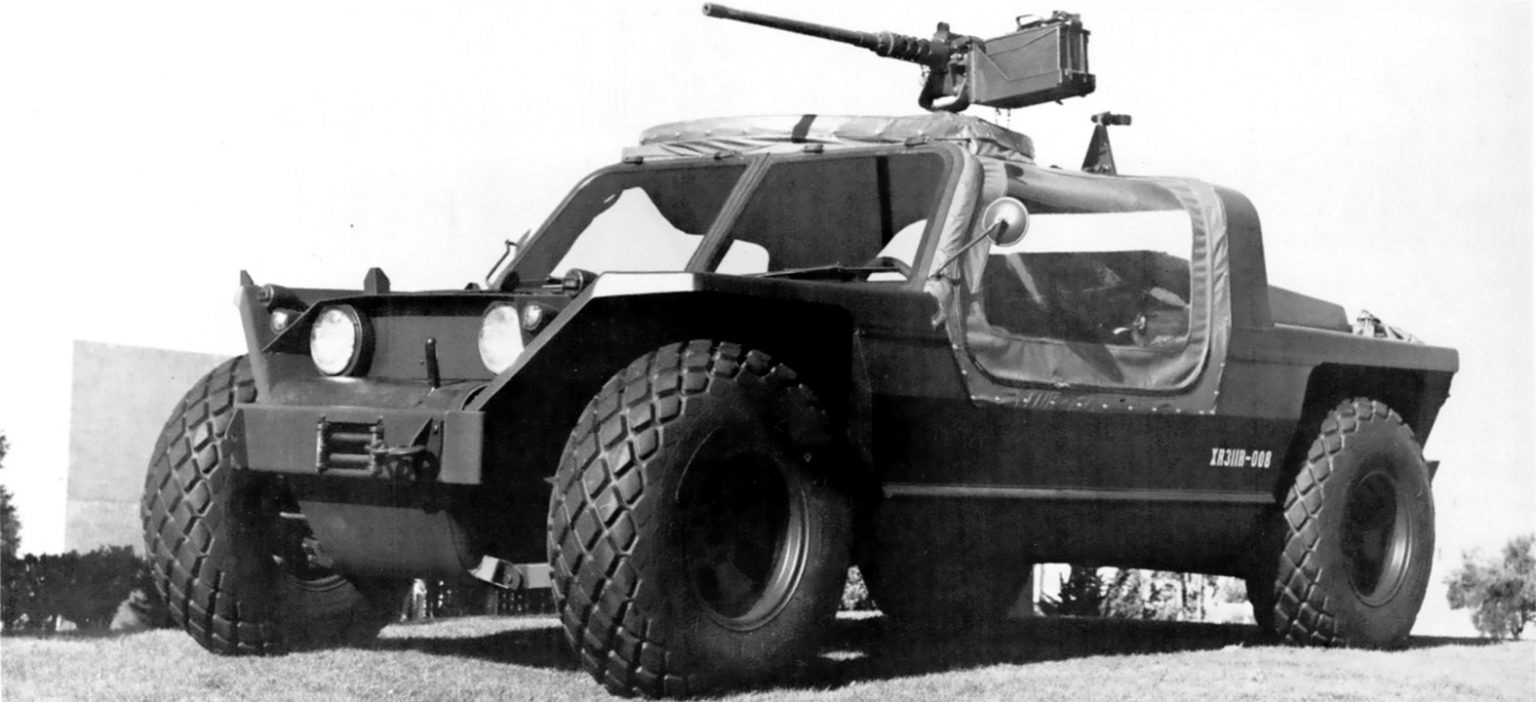
One of the proposals for a new truck was the FMC Corporation XR311, a rear-engine multi-purpose buggy. The XR311 was fast, could carry modern weapons, and had a fuel range of 300 miles on a 26-gallon fuel tank. Ultimately, the rear-engine setup caused some packaging problems, and the XR311 ended up being not exactly what the military was looking for. But the XR311’s story continued in a weird way as it’s linked to the legendary Lamborghini LM002, which you can read about by clicking here.
In 1977, the U.S. Tank Automotive Command began a search for a vehicle that could do it all. The XM966 Combat Support Vehicle Program called for a truck that could be an ambulance, troop carrier, cargo carrier, and weapons transport. Dozens of companies bid for the contract, and ultimately, AM General’s High Mobility Multipurpose Wheeled Vehicle (HMMWV) design won in the end.
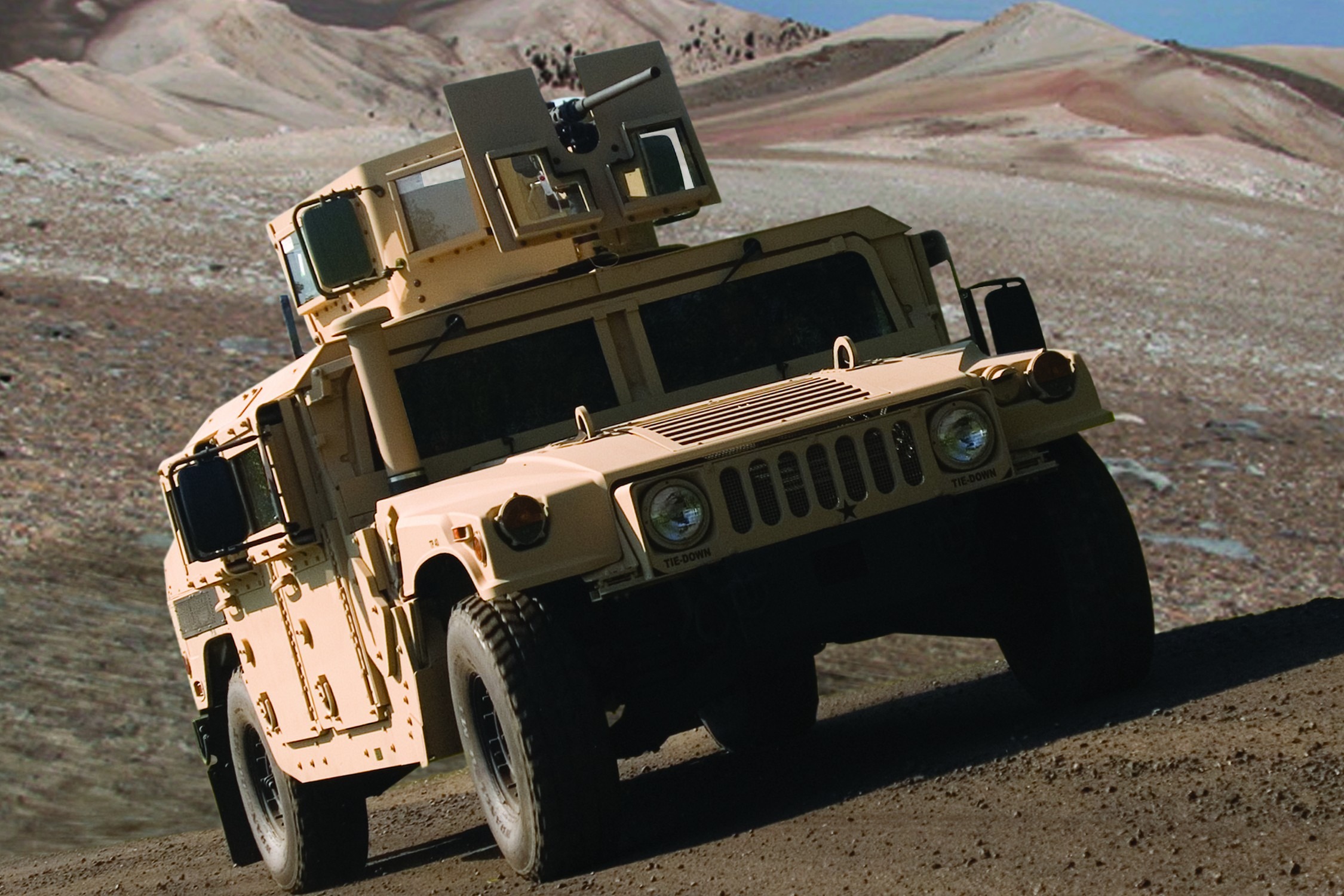
Warfare History Network describes the HMMWV’s design:
The first production Humvee came off the assembly line on January 2, 1985. The 11/4-ton truck had a separate chassis and body. The aluminum body was heat-treated, epoxied, and riveted. The Humvee was powered by a 90-degree GM 372 cid liquid-cooled diesel of very standard, traditional design coupled to a GM three-speed THM350 automatic transmission which in turn drove a New Process NP218 two-speed transfer box with lockable differential front and rear for full-time four-wheel-drive. Suspension was fully independent with coil springs attached to the A-frames with coaxial shock absorbers slightly forward to make room for the four drive shafts, one in each hub.
The channeled steel chassis was double dropped, boxed with five ladder cross-members. The frame rails were designed to be right next to the drive train, allowing the body to sit low for a low center of gravity. The doors and roof could be cloth over metal frame or armored, allowing for different variants. This would later prove significant as the Humvee would be deployed in combat without armor, and soldiers would have to use scrap metal and sandbags to add armor to their vehicles. The final production design could be fitted with any of three alternators, from 100 amp to 300 amp, charging two 12-volt batteries under the front seat. The radiator was placed at approximately a 45-degree angle set toward the rear to reduce frontal area damage by direct impact. Kelsey-Hayes disc brakes were mounted inboard and used a hydraulic boost system. A Saginaw 708 steering system also used hydraulic boost. Some models had a Warn Model W6000D25 winch mounted in front.
Split-rim wheels with 36×12.5×16.5 dimension were used with run-flat inserts for the bias-ply tires, allowing the vehicle to travel at 30 mph with one flat, and 20 mph with two flats. Top speed was 65 mph and range was 300 miles. Acceleration was a plodding 24 seconds from 0 to 60 mph, later improved to 18 seconds. Track width on all Humvees was 72 inches. An optional snorkel for deeper fording was included, along with an extended exhaust pipe, gas tank vent tube snorkel, sealed dipstick, and vented CDR valve. Optional equipment included a machine-gun mount kit, two spare gas tanks, a LAPES rear bumper, brush guard for the front bumper, and special spare tire mounting on hinges.
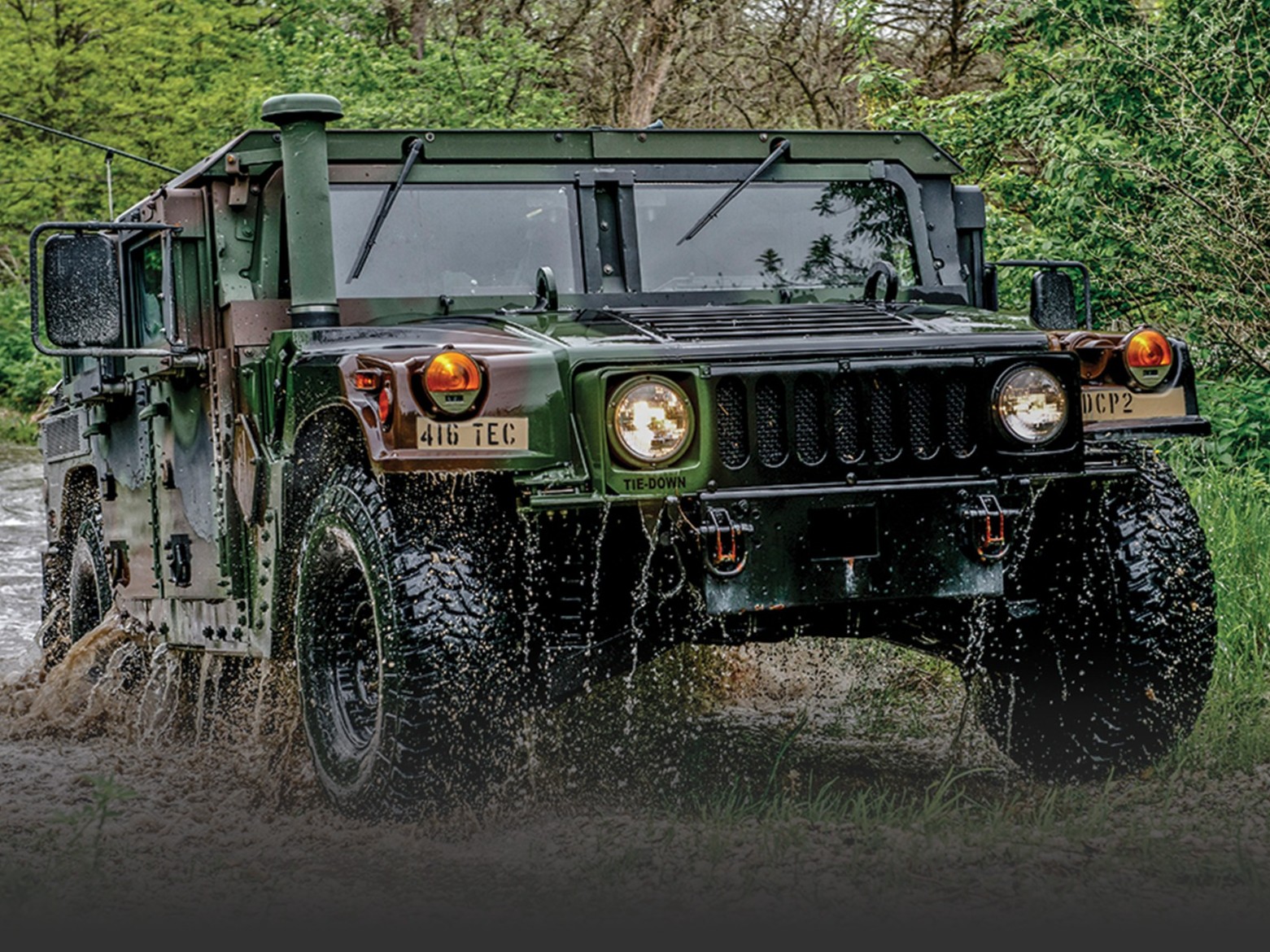
Something interesting about the HMMWV is that, due to its aggressive design, it’s a huge vehicle with a limited seating capacity. A standard version’s interior has seating for four, and this even includes civilian versions.
The Humvee, which was first a colloquial name but is now a mark of AM General, remains in production today. The U.S. model of the current Humvee 4-CT has a 12,100-pound gross weight, a 4,950-pound payload, and a 6.5-liter Detroit Diesel V8 good for 190 HP and 380 lb-ft of torque. These are not fast trucks. A newer Humvee hits 60 mph in around 18 seconds and can sometimes hit 85 mph depending on configuration. That’s not a comfortable 85 mph, either, but loud enough that you’ll probably want to wear earplugs.
Tactical Camper
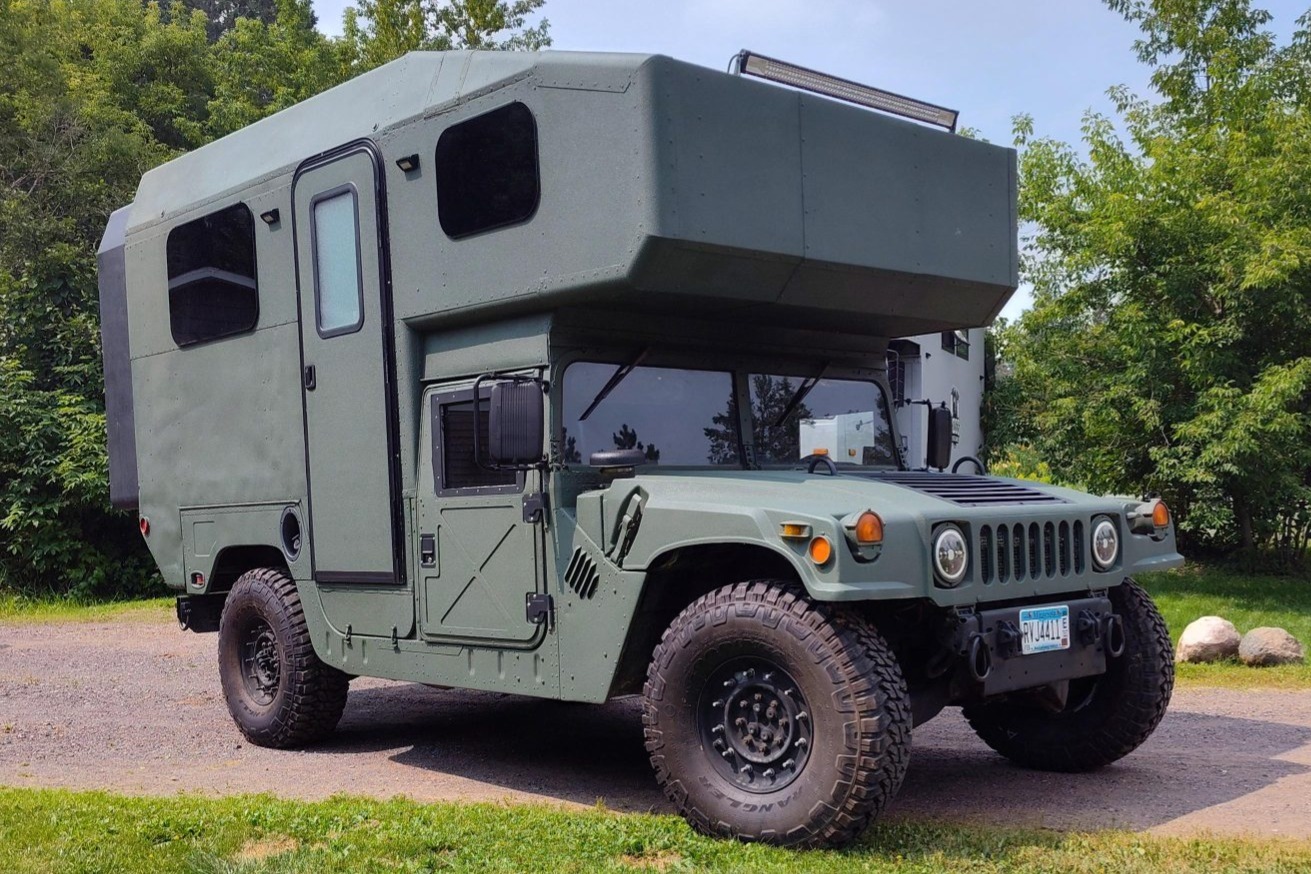
If that sounded slow, well, the truck on your screen is somehow even slower.
According to the Bring a Trailer listing, this 2000 AM General M997A2 HMMWV started life as an ambulance. This truck was retired and ended up getting a second life in private hands. It was then converted into a camper during 2023 and 2024, with the most dramatic change being a roof raise. Here’s an image of what a standard M997A2 looks like:

According to the Bring a Trailer listing, the roof was covered in RV sealant, and then the whole body was painted in bedliner material. The listing continues about the camper portion, describing that the black box on the camper houses the motorhome’s batteries, electrical system, propane, water heater, water pump, and additional storage. The listing continues, describing the interior:
The camper cabin features an L-shaped seating area with an electric fireplace as well as a kitchenette that has a sink, a two-burner gas cooktop, and a showerhead beneath a folding section of the counter. The ceiling, walls, and floors of the cabin are lined with wood paneling, while the countertops are constructed of butcher block. Further equipment includes a wall-mounted Midea air conditioning unit, a 30-gallon fresh water tank, a five-gallon gray water tank, an Ampeak power inverter, and residential-style power outlets along with pop-out windows above the seating area and sink.
The elevated sleeping area at the forward end of the cabin features a queen-size mattress with a 6″ thickness as well as an Insignia flat-screen TV. LED lights are fitted above, while pop-out vent windows are installed on either side.

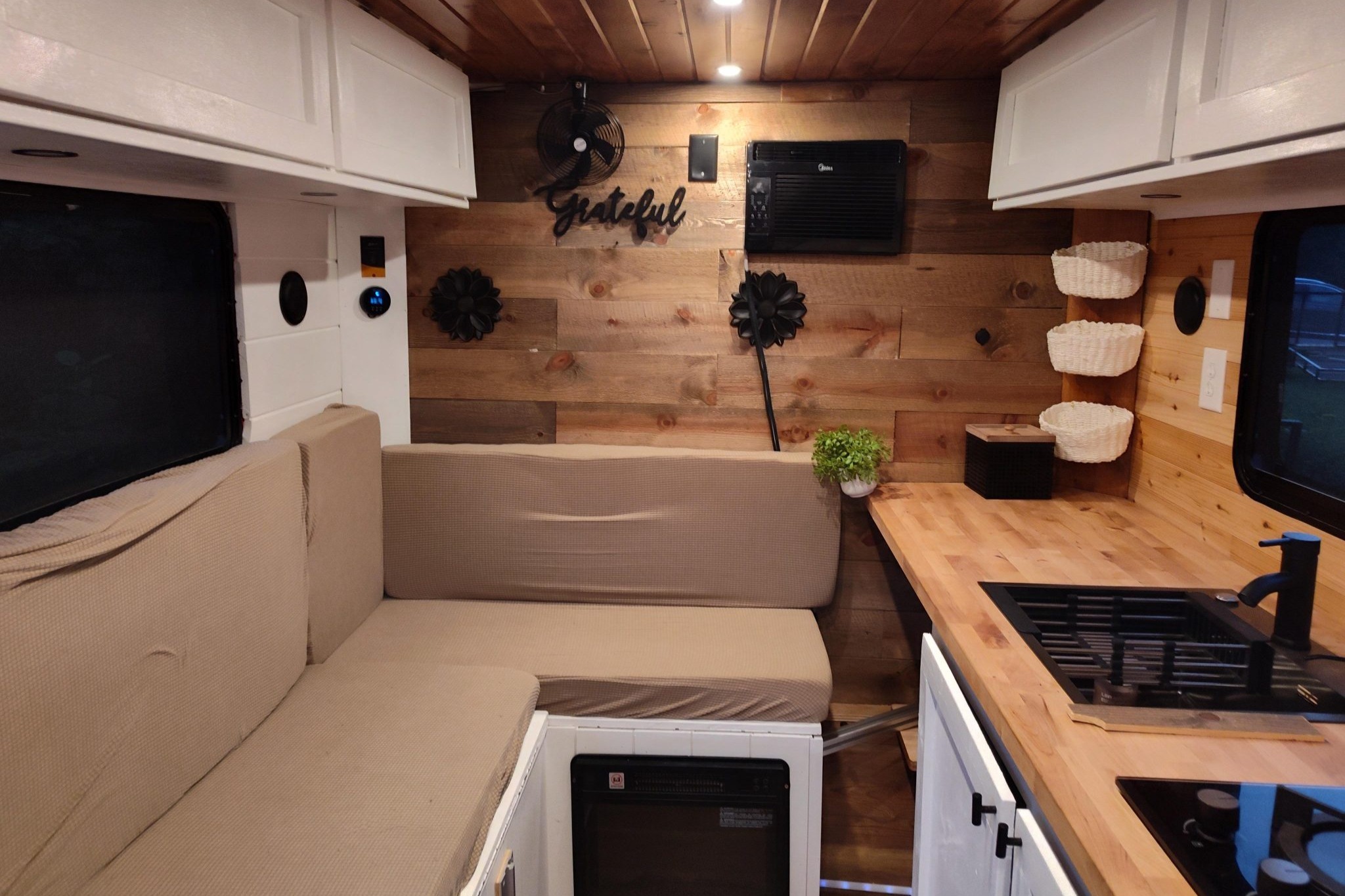
The camper part of this equation is pretty impressive. I love the liberal use of wood, and the interior looks better than a factory-built rig. Apparently, you do get a toilet, too, albeit one of the portable variety. The main bed looks pretty spacious, and I like that ventilation was considered in this design. It has a roof vent over the bedroom, which is something that some factory-built RVs don’t come with anymore!
Admittedly, I’m not a huge fan of the trend of covering everything in bedliner. I’d rather see an automotive-style paint job, but that’s just me. Bedliner as paint is a big trend right now, so I might be in the minority on that one.

Perhaps the weirdest part about this camper is the Humvee underneath. This one is powered by a 6.5-liter naturally aspirated Detroit Diesel V8. These engines made 160 HP and 290 lb-ft when new, and were not known for speed by anyone’s measure. The official 60 mph acceleration time for a Humvee with this engine is 24 seconds. That’s slow, but I’ve driven slower trucks.
In my experience, and the experiences of those who own Humvees with the 6.5, you might be able to get your truck to 70 mph or maybe even past it, but you won’t want to do that for very long. These trucks are very loud when they’re idling. At speed, it’s so loud that the only way to even consider having a conversation with anyone in the cab would be to have everyone wear headsets. For many, including even the experienced commenters on Bring a Trailer, a realistic cruising speed is between 55 mph and 60 mph, and that’s for a stock Humvee. This one is basically a giant wall that you’re forcing through the wind.
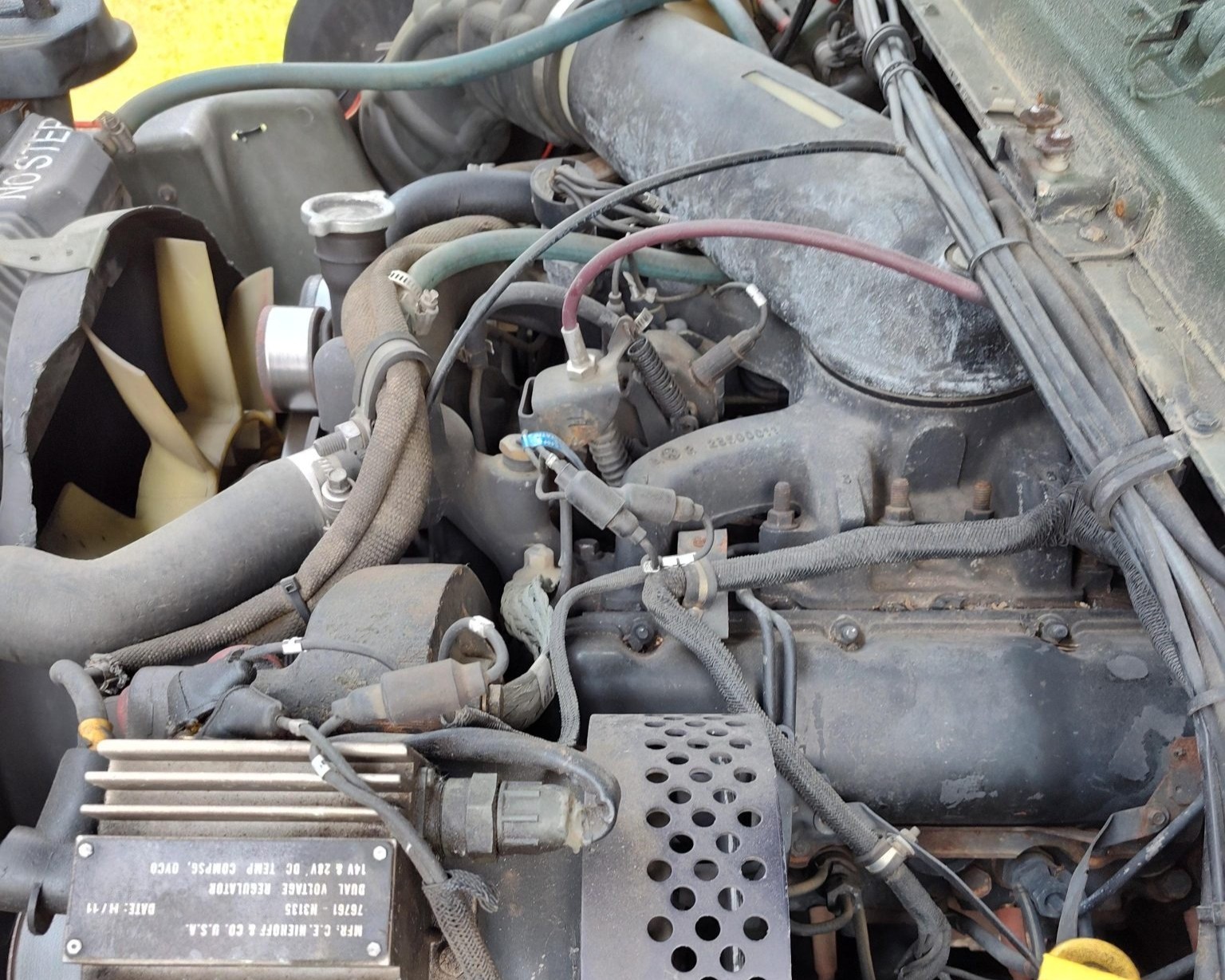
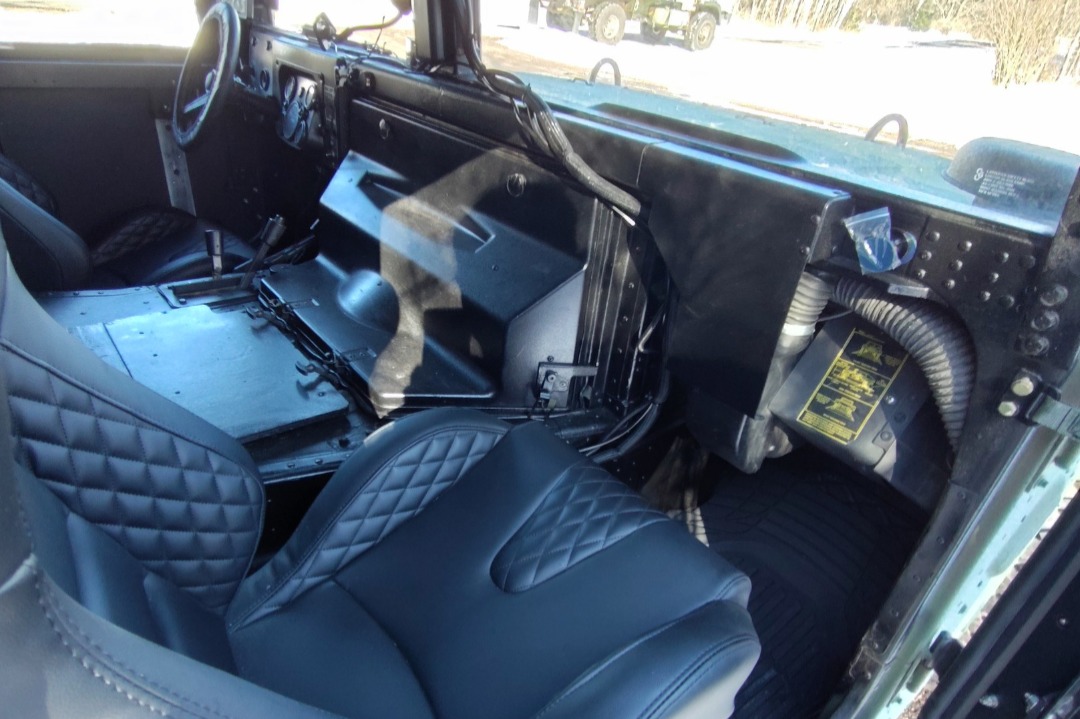
With that said, the additional equipment sounds pretty good. The truck has front and rear Torsen limited-slip differentials, gear-reduction portal axles, a dual-range transfer case, and a 4L80E four-speed automatic transmission. It sounds like this RV will get you darn near anywhere, so long as you don’t need to get there anytime soon.
Slow, But Well-Done?
The part that I’m still surprised about is the huge contrast between the tough and “tactical” exterior and how soft and gentle the interior is. I also love what appears to be quality work on the conversion. The camper portion looks like it’s built better than most campers from a big company.
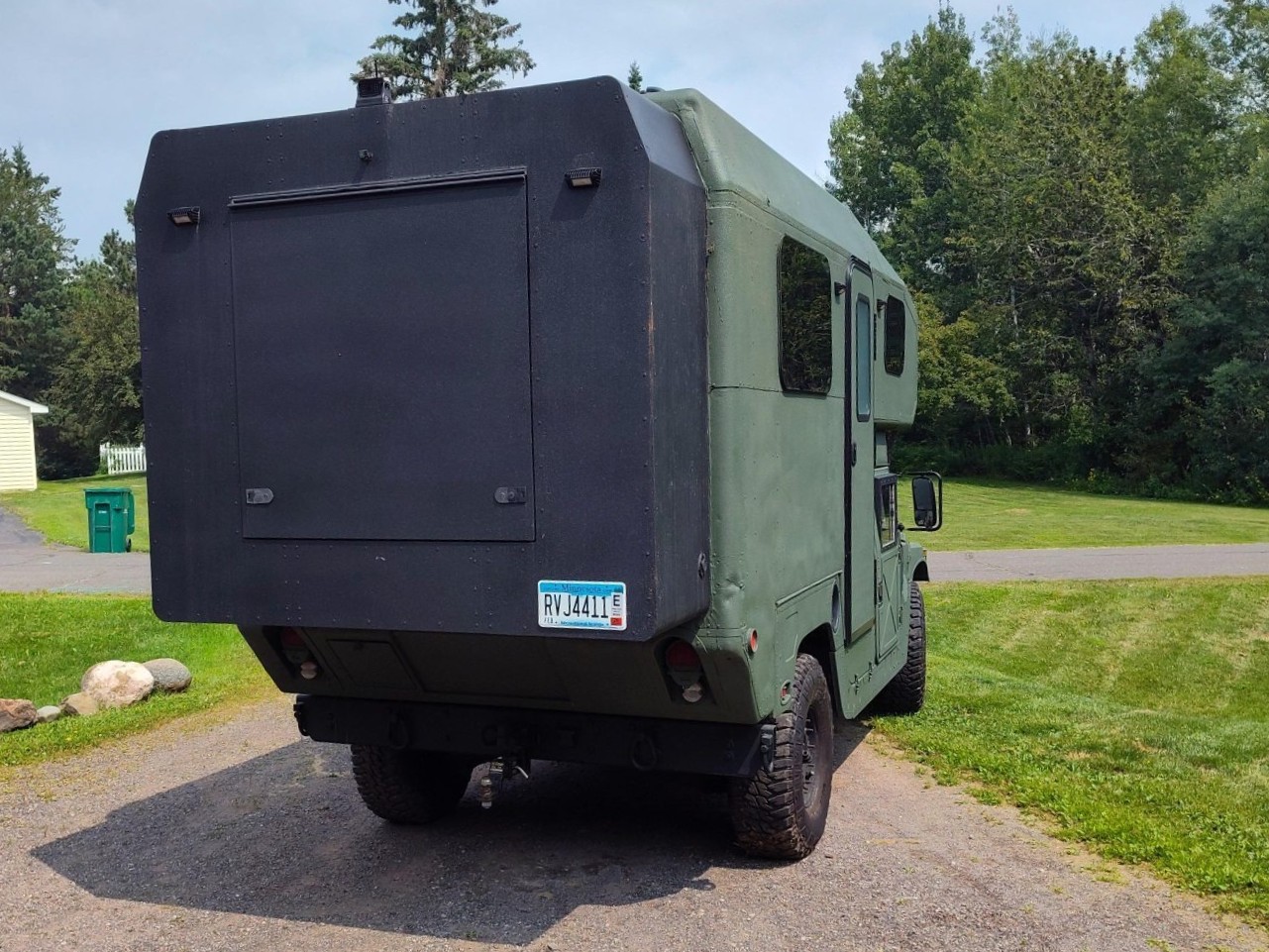
If you’re interested in this beast, which is located in Minnesota, it’s currently bidding at $11,000 with six days to go on Bring a Trailer.
I didn’t write about this camper at first because I didn’t know how I felt about it. In some ways, I still can’t put my feelings on it. On the one hand, that interior is phenomenal. On the other, I wouldn’t want to be behind the wheel of it on a cross-country trip. But it is seriously cool, and someone will undoubtedly want it. If you’re that kind of person, I’d love to know how you would use it!

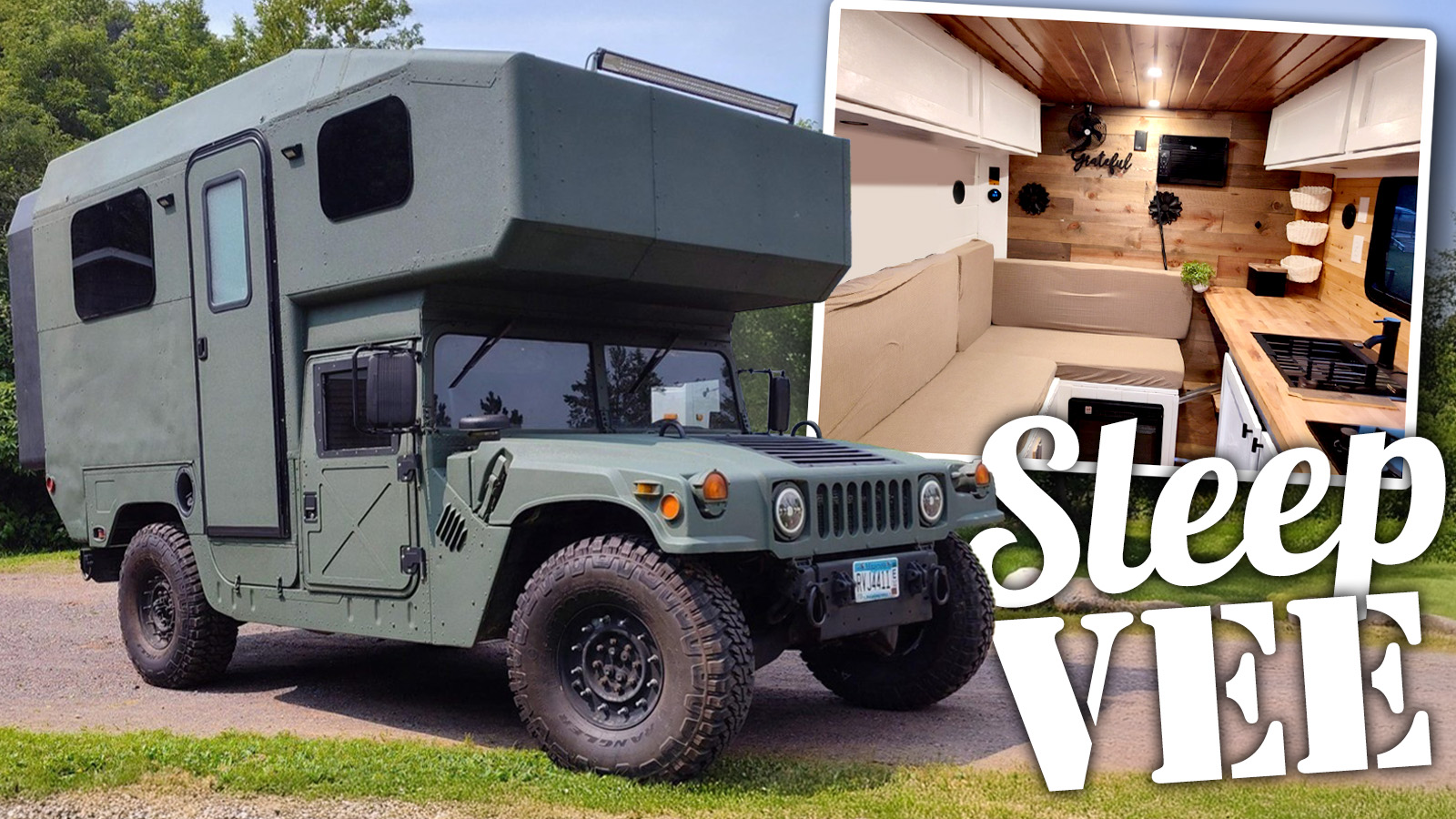







Not for me since my idea of camping is when the hotel room window faces the woods.
This thing is a perfect example of how RVing is emphatically not about the journey. Getting places with an RV is generally an exercise in frustration (and with this thing, patience), but once you’re there you get to spend the night someplace a lot of people never will. To me, RVing is all about the destination.
Can go anywhere, as long as there aren’t tall trees lining the trail.
I do not want to be anywhere that requires me to drive, ride in, hear, smell or see this thing.
I am less happy today than I was before I knew this existed.
Honest question as to all these lifted/”go anywhere” type camper homes: can they really? Seems they’d be apt to fall over on any kind of terrain that would require such extreme running gear? I am sure there’s very rough/rutted fire roads and the like where this would be just the ticket though.
I have zero desire to have anything to do with these sorts of vehicles, but the ones I see are in places easily accessed by a Subaru, or even a low clearance hatchback. I’m sure there are places that have relatively flat obstacles and lots of extra space where they would do better, but for where I go, they do not fit, and could even cause the road base to collapse in places from excess weight. My personal view is that in real world use, they are no better than a Subaru, and in many cases significantly worse.
One of the reasons why I would consider a converted Transit, Sprinter or Econoline as a RV instead of trailer to tow with an angry truck if I would look at RVs
You’d be surprised just how far these gargantuan trucks can go off-road without falling over or anything like that. The Mercedes Unimog expedition motorhomes have proven themselves to go just about anywhere.
Their kryptonite is not so much rough terrain as it is a tight trail. This Humvee would have never made it down the fire roads I drove on out in Washington because it’s too darn tall.
No good for Europe where Humvees are too wide for historic town streets. Mindyou quite a few of the modern German panzer mobile homes are also…
So you see them on the dual carriageways, towing a little Clio or similar behind.
The problem with the XR311 is that it had too much Dune Buggy Spirit. It’s not great for combat readiness when the platoon is changing their call signs to Archie, Jarhead, Betty, and Veronica, and trying to launch off of dunes instead of dutifully executing regime change under false pretenses.
It’s like the Simpsons episode where they got new uniforms and then it rained.
The ironic thing though is that today the US Army is buying Chevy Colorados stripped of the body and turned into a buggy.
https://en.wikipedia.org/wiki/M1301_infantry_squad_vehicle
As a non-American, this line confused me:
It’s a
JeepAmerican thing, you wouldn’t understand.“It’s a ‘MURICA! FUCK YEAH!! thing. You wouldn’t understand”
fify.
It’s like when a German person drives a BMW and makes dive-bombing noises. Or if a Japanese person gets in their Mitsubishi and plays “Saved by Zero” by the Fixx on Spotify.
That’s a thing, right? No?
So we’re the only country with this issue?
“German person drives a BMW and makes dive-bombing noises”
Still too soon in Poland.
When Germans come to Poland, their BMWs are already there
It’s a reference to the people that saved civilizations ass during WWII
The Russians?
“… was the M151 Jeep, which had a design dating back to 1959 …”
1941.
M151 was CJ-5 based
“Instead of the jeep’s relatively light 14-ton rating, it would have a hefty 1/4-ton capacity (sometimes referred to as a 4-ton rating).”
OK you lost me.
That site had a bizarre typo there that made it into the blockquote. I corrected it!
Thanks that makes a bit more sense. Still why is a 1 1/4 ton capacity sometimes a 4 ton rating? Might that be 5/4 ton?
“The 1+1⁄4-ton, 4×4, Kaiser Jeep M715, sometimes called the “Five quarter (ton)”, for its 1+1⁄4 (or 5⁄4) ton payload rating”
https://en.m.wikipedia.org/wiki/Kaiser_Jeep_M715
That’s a good question! I’ve done some digging and haven’t really found an answer I’m comfortable with. One Air Force page I ran across even claimed that the 1/4 ton Jeep actually had a carrying capacity of 1/2 ton.
I’ll ask David, because maybe our resident Jeep expert knows how to decipher this!
It’s cool, don’t get me wrong, but I don’t think anyone would want to put up with this thing on any road with a speed limit of 55 or greater for any period of time at all. Add in fuel economy measured in gallons per mile, and it seems like the kind of vehicle that changes hands rather frequently.
I’m amazed that the Humvee launched with split-rim wheels in the 80s. I thought they were retired as death traps for mechanics a decade before that.
I really hope the modern versions aren’t still using them.
They are, the civilian HUMMER H1 had them, too. But they aren’t like a traditional split rim, they are multiple parts, but they’re bolted together more securely. The purpose is to allow for a new tire to be mounted in the field without access to a tire changer machine
Split rims are still used on brand new Class 8 trucks today.
Can’t pass anything, not even a gas station
And the MPG is?? 5/. 8/. Dare I go as high as 10/?
I believe the base Humvee was 8, with this brick glued to the top, I bet 4-5.
Don’t forget you gotta add another $10k to hire a priest to exorcise the spirits trapped in that former ambulance.
There are several shops that specialize in power upgrades for these, and as such things go, they’re not very difficult to swap in a 6.2 or 8.1. Neither is sound insulation.
$100k is a starting point. with another $20k in upgrades, this will be a lot nicer.